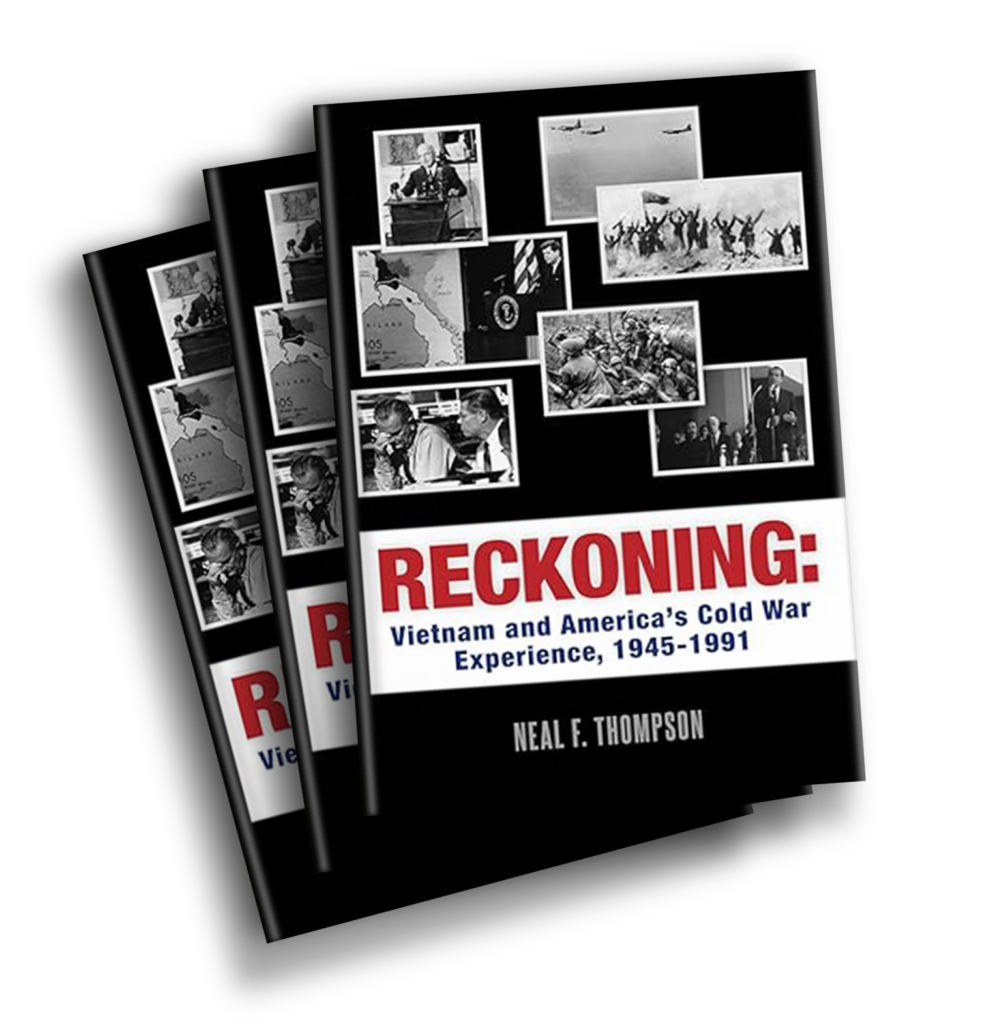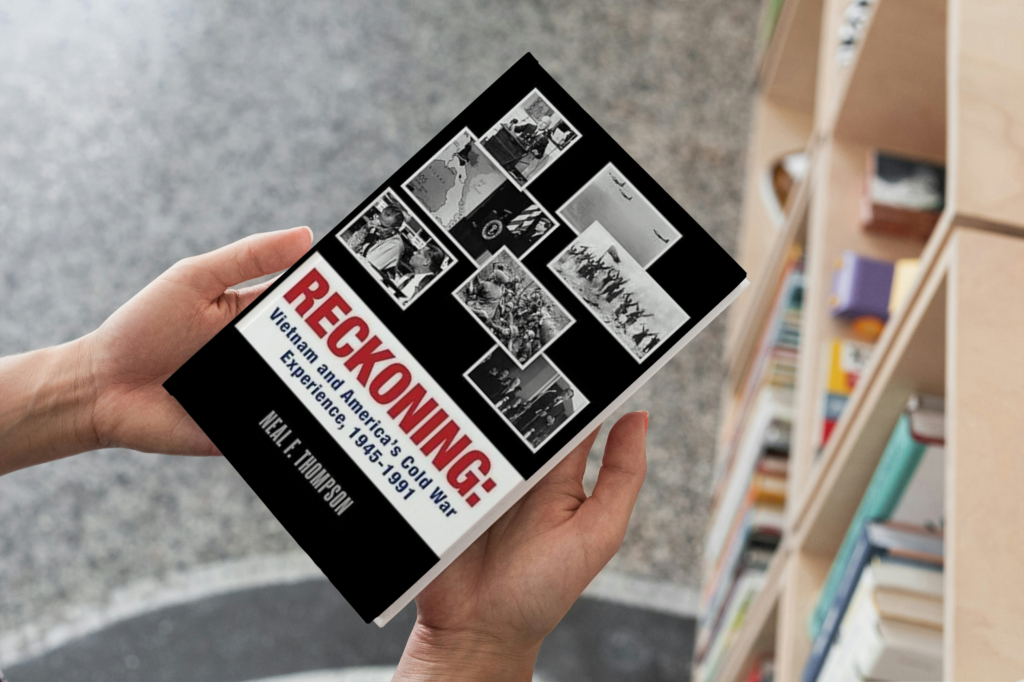A Historian Unafraid to Challenge the Normal
Explore the Difference between History and Ideology.
Uncover the untold truths of America’s Cold War history. Reckoning challenges conventional narratives, exposing hidden facts and revisiting pivotal decisions that shaped global conflicts.



About the Author
Meet Neal F. Thompson
Neal F. Thompson is an accomplished historian, researcher, and author known for his fearless approach to revisiting Cold War history. With a passion for uncovering hard truths, Thompson has dedicated years to analyzing America’s foreign policy decisions, particularly in Vietnam and its broader Cold War engagements. His writing dismantles widely accepted narratives, exposing overlooked facts and challenging long-standing historical orthodoxy.
Through Reckoning, Thompson presents a compelling, fact-based argument that reshapes the way we understand America’s global strategy from 1945 to 1991. His meticulous research and incisive analysis make him a powerful voice in historical literature, bringing new perspectives to readers who seek an honest and unfiltered account of the past.
About the Book
Reckoning: The Untold Truth of America’s Cold War Strategy
The Cold War is often painted as a noble struggle, with America heroically resisting Communism across the globe. Reckoning: Vietnam and America’s Cold War Experience, 1945-1991 dismantles this comforting myth, revealing a far more complex and often troubling reality.
This book challenges the mainstream portrayal of key events—from Truman’s handling of Soviet espionage to the brutal campaigns in Korea and Vietnam. It critically examines the decisions of American leaders, revealing how fear, miscalculation, and political pressure shaped U.S. foreign policy. Reckoning argues that condemning America’s war in Southeast Asia while celebrating Cold War victories is intellectually inconsistent—suggesting that the very foundation of the Truman Doctrine must be reevaluated.
With a sharp, evidence-driven narrative, Reckoning urges readers to question long-standing assumptions, confront inconvenient truths, and view history through an unbiased, analytical lens. Whether you are a historian, a student of political science, or someone curious about Cold War history, this book will challenge and expand your understanding of America’s global role during the 20th century.


Read Reckoning: A Book That Redefines History
Discover the Cold War’s hidden realities. Get your copy today and challenge the narratives you’ve always been told!
The Inspiring Journey of Neal F. Thompson
Neal F. Thompson entered the United States Army in August 1970, two months after graduation from high school. He completed flight school at Ft. Rucker, Alabama in November 1971 and served a one-year tour of duty in Vietnam as a helicopter pilot in Troop F (Air), 8th US Cavalry, 1st Aviation Brigade. He logged nearly 600 hours of combat time was awarded the Distinguished Flying Cross (1 oak leaf cluster) and the Purple Heart. Following his discharge in 1974, he attended Triton Junior College in River Grove, Illinois, from which he graduated with high honors in 1976, and the University of Illinois at Chicago, where he was a Lincoln Scholar, receiving a B.A. in history with high honors in 1978. He completed his education at Northwestern University Law School, from which he graduated cum laude in 1981. After ten years of private practice, he became a prosecutor in DuPage County, Illinois, where he remained for the next thirteen years, being appointed Supervisor of the Financial Crimes and Public Integrity Unit in 1996. He taught legal writing at DePaul University Law School and lectured at both the state and the national level on trial practice, reckless homicide prosecution and forensic evidence. Mr. Thompson joined the Illinois National Guard as a helicopter pilot in 1975 and served for 28½ years, retiring in January 2003. He practices law today in Chicago and lives in Naperville, Illinois, with his wife Jaime and their children, Nick, Zack, and Cate.
Takeaways from The Reckoning
What makes this book a must-read
Unveiling Cold War Myths
Reckoning challenges mainstream narratives, revealing the true impact of America’s Cold War decisions.
Deep Historical Analysis
Through meticulous research, the book provides a comprehensive examination of U.S. foreign policy from 1945 to 1991.
Objective & Unbiased Perspective
This book applies a single, fair standard to all sides of history—unraveling the complexities of Vietnam and beyond.

RECKONING: VIETNAM AND AMERICA’S COLD WAR EXPERIENCE, 1945-1991
By Neal F. Thompson
“A revisionist history of the Cold War challenges simplistic notions of America’s heroic victory over communism. The now-conventional historical interpretation of the Cold War imagines a relentless half-century of bipartisan resistance against the global spread of communism inspired by American diplomat George F. Kennan’s famous theory of containment. It sees the low points of anti-communist policy as being the unhinged witch hunts of McCarthyism and the morally and strategically disastrous military campaigns in Southeast Asia. However, debut author Thompson, a practicing attorney, contends that the real story is a far messier one and that foreign policy during the Cold War years was largely shaped by domestic political squabbles, electoral opportunism, and brazen mendacity. President Harry Truman, he says, was skeptical about the strategic significance of South Korea but understood that its surrender to communistic forces would be a political catastrophe for the Democratic Party. Truman’s intervention in Korea became the paradigm for U.S. foreign policy in Asia as a whole, the author notes; neither Presidents John F. Kennedy nor Lyndon Johnson were ever truly committed to repelling communists in Vietnam, he says, but both worried that the perception of weakness in the face of communist aggrandizement would be punished at the polls. The book offers similar analyses of the distance between conviction and action for Presidents Dwight Eisenhower, Richard Nixon, and Jimmy Carter. Thompson argues that U.S. foreign policy, built around the Truman Doctrine, did in fact contribute to the demise of both communism and the Soviet Union, but the implementation of that doctrine was still largely “directed from start to finish by an incompetent, dishonest, corrupt political class, with evil conduct, dumb luck, and the law of unintended consequences providing this country with its Cold War victory.”
The author researched and wrote his study over a span of 16 years, and his meticulousness is evident on every page; his command of the relevant historical materials, both primary and secondary literature, is beyond reproach. His thesis is an impressively subtle one, avoiding demonization or valorization of any of the primary actors. For example, President Ronald Reagan is described as the one American president who governed in a way that was congruent with his own political philosophy, attached in word and deed to the destruction of the Soviet Union. However, the author also points out what he sees as the lawlessness of Reagan’s presidency—a continuation of the Cold War legacy in the executive branch, established by Truman. As a whole, the study largely covers familiar ground and relies heavily on the secondary literature—a fact the author acknowledges by calling it a “work of synthesis rather than original history.” Nevertheless, it’s a valuable single-volume introduction to a plausible counter-history of the Cold War that ably calls into question, among other things, the notions that the Vietnam War was unwinnable and that McCarthyism was motivated by baseless fantasy. Also, Thompson provides some trenchant thoughts on how to rehabilitate American democracy, including recommending compulsory military service for all citizens. An impressively argued takedown of historical orthodoxy.”
Testimonials
Col. Andrew Finlayson (USMC Ret.)
Reckoning: Vietnam and America’s Cold War Experience, 1945-1991
By Neal F. Thompson
Charlevoix Books
2020
5.0 out of 5 stars; The Hard Truth
This book by Neal Thompson should be on the required reading list of anyone who is interested in the truth about the Vietnam War. Marines who fought in that war and Marines who have fought in more recent wars will find his analysis, well-reasoned and informative. Some may even find it inflammatory since it makes a very powerful case against the civilian leadership of our nation during the period of the Cold War.
He puts the Vietnam War into the context of the political and geo-strategic imperatives of the Cold War, providing clarity and honesty about the decisions made by our "leaders" from the close of WWII to the Fall of the Soviet Empire. As a Vietnam War veteran and distinguished lawyer who has studied the war for decades, Thompson brings his highly trained legal mind and logical approach to analyze the motivations of American political leaders during the Cold War and how those motivations resulted in disaster in South Vietnam. In addition, he exposes how the same motivations that produced the Vietnam War could be found in every military action our nation has embarked on since the end of the Cold War.
His book is well-researched, richly footnoted, and compelling, and his lucid prose style makes for a highly readable and informative presentation. It is broad in scope, yet he provides ample detail to support his arguments.
I was especially impressed with his analysis in Chapter 13, The "Unwinnable War," where he utterly destroys the orthodox mantra that there was no way to win the Vietnam War. He lays out in exquisite detail how there was a clear plan for winning the war by cutting the Ho Chi Minh Trail in Southern Laos and how the pernicious and foolish adherence to the 1962 Geneva Accords on the Neutrality of Laos and Cambodia by President Johnson’s administration made this option impossible until it was too late to implement. His argument on this topic is strengthened by the words of the North Vietnamese.
Equally impressive is Thompson’s take down of what he labels the “war crimes industry,” the endless cascade of war crimes allegations by the antiwar left that served to demonize an entire generation of veterans. With a detailed analysis of various books and media presentations, he demonstrates clearly that the veterans identified therein are not who they claim to be and that the war crimes alleged are demonstrably false. In fact, when the facts and figures regarding day-to-day operations in Vietnam are compared to that of the operations in Korea and World War II, it becomes clear that the men who fought in Vietnam were as honorable and decent as any generation of American veterans.
Thompson also poses a rather unique argument and one that I have never seen before in print: that had the Democratic Party won the 1968 presidential election, the war might not have been lost. He is critical of both political parties, providing evidence that both parties were more influenced by domestic political concerns than the geo-strategic realities they were confronted with. Many readers will be surprised by his comparison of the actions taken to trigger President Trump’s impeachment with those taken by other former presidents, making the case that they often did things that were far more egregious than the actions taken by President Trump. He cites several actions taken by Presidents Truman, Kennedy and Johnson that, given the controlling standards and law, should have triggered impeachment proceedings.
In Thompson’s final chapter he sums up his basic argument, which is the military disasters our nation has suffered during the Cold War and since were highly predictable and the natural result of domestic political considerations. In this sense, his argument is rather unique, and some readers will find it unsettling or even inflammatory. However, Thompson’s book is not a polemic, it is a rich and detailed history of the Vietnam War in the context of Cold War political decisions. It is a cautionary tale of which political and military readers should take note.

RECKONING: VIETNAM AND AMERICA’S COLD WAR EXPERIENCE, 1945-1991
Reviewed in the United States on April 29, 2019
It has been 44 years since the Vietnam War ended; yet, the real discussion about it has just began. Why? Because now, the anti-war/anti-America/anti-South Vietnam no longer has the monopoly of the loud speaker. Further, with the open up of Russia and other communist archives, Hanoi's intoxication of victory, and US declassified materials, any thoughtful researcher can easily clear "the fog of war" in their mind and produce serious scholarly & thought provoking work. A great example of this is Neal Thompson's "Reckoning: Vietnam and America's Cold War Experience, 1945-1991". For the last 40 plus years, I have tried to read and learned as much as I could on what happened to Vietnam and how we, South Vietnam and America, "lost' it. America lost a war, and Vietnamese people lost a country. With terrible human costs. Worst, in the words of Hanoi's most famous writer and female volunteer to fight "America imperialists" Duong Thu Huong: "On April 30 1975, I sat on the sidewalk of a Saigon street, broke down and cried for my wasted youth and my generation because I realized that a barbaric regime had just won over a civilized one. How could that be?" We have since tried to find answers to that question: "how could that be?" Neal Thompson has provided very thoughtful answers to this. His is simply one of the most insightful and well research books on Vietnam I've ever read. It is so easy just to rehash long established conventional "wisdom". Many have done this and pat themselves on the back. Not Neal Thompson. Although I don't want to spoil it for you, but here is a hint. Regarding Vietnam, I used to say "Kennedy started it up, Johnson screwed it up, and Nixon gave it up." Having read Thompson's well-analyzed and well-documented work, having been living in Massachusetts for 30 plus years, and having gotten a degree from Harvard Kennedy School of Government, I now have to summarize the War as 'Kennedy started AND screwed it up". You will do yourself a huge favor by reading "Reckoning: Vietnam and America's Cold War Experience, 1945-1991"
TESTIMONIALS
Reviews for RECKONING: VIETNAM AND AMERICA’S COLD WAR EXPERIENCE, 1945-1991
By Neal F. Thompson
I was really surprised by not only how fascinating “Reckoning...” by Neal F. Thompson was, but how well-researched, documented, and presented it was on every level, from major international historical events to social and political climate/influence of the era. At almost 600 pages, it is not a fast and easy read by any stretch, but it will take you through whole different perspectives and ideas regarding Cold War history and the US’s role in it that you’ve never thought of before. It certainly isn’t the mainstream opinion – yet Thompson makes a powerful case for his ideas – backed up with compelling sources that will give anyone pause at the least, or a paradigm shift at the most. I thought that Thompson’s narrative was very easy to read, and for being such an ‘educational’ book, was entertaining as well. I do feel like I learned A LOT reading this, but also had a good time doing so, the way he brought the history to life, and the attention to political and cultural details that gave this book genuine authenticity that is absolutely imperative in a historical book such as this. Great pacing, formatting, and the editing is nearly flawless. Highly recommended for fans of historical nonfiction.
I was blown away by this book, “Reckoning: Vietnam and America’s Cold War Experience” and read the whole thing in one week, which is fast for me, especially considering I have no free time to read these days, and this is a pretty long book!! But it just seemed to go by so fast and I never wanted to stop reading it, even late into the evening. I was mesmerized by the world Neal F. Thompson presented here in his tome, and while I have always had a strong interest in history and politics, I don’t usually read these types of books for pleasure. What really struck me here was how Thompson takes so many conventionally held ‘beliefs’ and tosses them on their heads, but does so with an impressively vast wealth of sources to back-up his positions. I wasn’t familiar with all the events he wrote of here, but I like how he thinks outside the mainstream and gives evidence as to why... it was interesting to read about all the conflicts and the intrigue... shed so much light on several topics that I haven’t thought all that much about other than what I learned in college, and I’m really glad I was exposed to. Even if we don’t agree with all of it, it is invaluable to have a fresh perspective here. I imagine some might consider this book ‘controversial’, but to me it made a lot of sense... surprisingly so! Despite its hefty weight, I found this book moved well from beginning to end, and I would solidly recommend this book for anyone who wants to read an alternative view on history with an open mind.
I admit I didn’t really have high expectations when starting this book “Reckoning” by Neal F. Thompson, seeing as how I’d never read anything by this author before, and historical nonfiction can be so hit or miss for me…. Too often I find it dry and almost “textbooky’ or more for a college class than pleasure reading. Or worse – just a waste of time as it just recycles the same old information we already know. But I got sucked right into this one and was completely hooked all through to the end! I was so immersed in this book and impressed with the level of detailing on almost every single aspect. A lesser author would have glossed over some of these concepts/ideas that Mr. Thompson articulately brought to light and documented with his thorough research that honestly felt irrefutable at times…eye-opening and enlightening. Felt like I got a great dose of historical reality and some viewpoints that were different from my own, but Thompson makes so many good points throughout it is almost staggering. I found the book hard to put down, and I feel like I learned so much more than had I had anticipated I would. Incredibly well-researched with an impressive blend of facts and alternative viewpoints with an engaging, flowing narrative that takes you along for the remarkable ride. Professional formatting and editing is also noted. Would be interested in reading more from Thompson in the future. Recommend.
4. Great writing, great premise, great research/facts, great execution…. Overall a terrific read that I feel really opened my eyes to the possibilities that our world is shaped by very different ideas and actions then we have always been led to believe. I’ve always had a fascination with the relationship with Russia and US during the Cold War, but have never read much on it that wasn’t centered around a fiction-novel. While some scenarios posited here might feel like a work of speculative or alternative fiction, Neal Thompson maintains an impressive credibility due to the strength of his research and sources. The historical record is quite clear here, and if you read this with an open mind – as most intelligent people should do (knowing there is ALWAYS more to the story than we’ve been told) then you are in for a treat. Regardless of your political leanings, this is a riveting and game-changing book that will challenge your beliefs. Intelligent, complex, and thought-provoking, it encompasses even more than the title indicates – taking us around the world and even to current days (mentioning Obama, Bush, John Kerry and more…) I thought Thompson’s observations to be quite astute, and I was impressed with the way he managed to turn what could have come across as just boring ‘lectures’ into a readable story that feels grounded in substance and authenticity. There are different angles he covers (too many to go into here), but it provided a well-rounded approach to an interesting alternative perspective for our world’s political history. Recommend.




